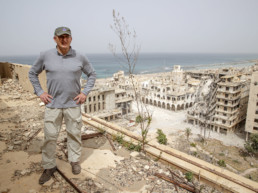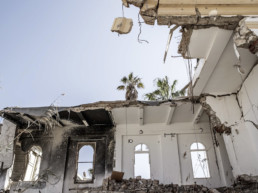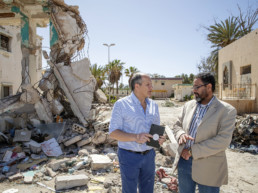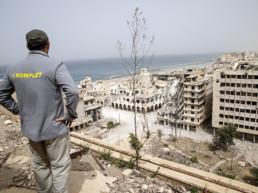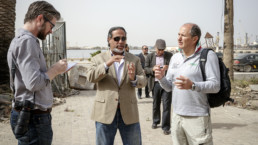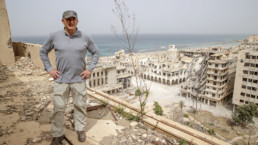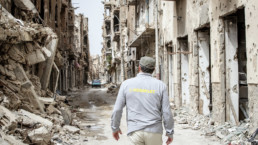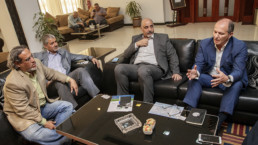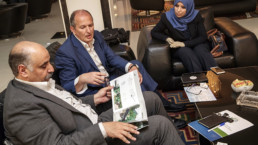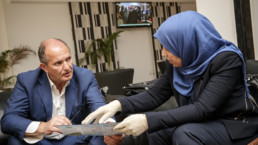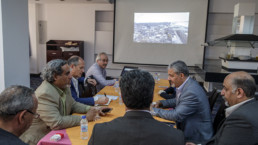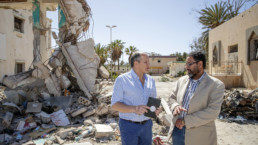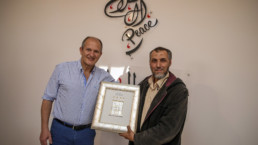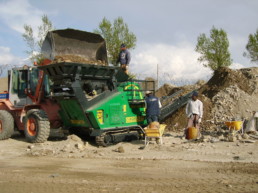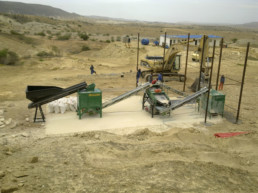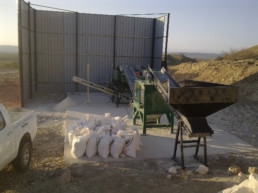
The Arab Phoenix Project - February 2016
Why plan an intervention of the Italian Government in the future reconstruction of the main Libyan cities.
International aid will certainly play a key role in rebuilding the country, at least in the first post-crisis phase. Not only will it be fundamental to reconstruct the infrastructures and the buildings, it will also be key to foster a positive relationship between Italy as a country, which must continue to be seen as a main partner and friend, and Libya.
Italy’s role will be understood better with tangible, effective interventions, carried out openly as soon as it is possible to operate on the territory with a reasonable degree of security and lasting for a long period of time.
There will also be positive repercussions for both the Italian companies involved in the project from the start and for those that will get involved in the later stages of the reconstruction – a process that, given the very heavy damages, will generate a revenue worth several billions of euros.
For these reasons, Show Yourself created this Project and sought out the most qualified Partners for its realization, identifying KOMPLET Spa as the Technical Partner who can, together with the Italian Development Cooperation and the Italian NGOs present on the Libyan territory, effectively participate in this ambitious project.
KOMPLET Spa is a world leader in the design and production of tailor-made plants for the recycling of building materials. It was recently chosen to supply its machinery for similar projects in Homs, Syria, by the UNDP, and in Iraq by an English NGO.
Premises
Seeing certain areas of the city of Benghazi completely destroyed by fighting and reduced to piles of rubble brings to mind similar images from other Middle Eastern countries, such as Syria and Palestine (Homs, Aleppo, Gaza) or from Misratah, Sirte and Tripoli at the end of 2011. I also believe that Derna and other Libyan cities that recently dealt with intense clashes have been damaged and that, in all probability, that they will suffer further damage in the coming months due to military actions aimed at “pacifying” the country. Going back in time, these photos remind us of the images of European cities bombed during the Second World War. It is not by chance that, at the end of that conflict, the reconstruction in Germany was regulated with a regulation (DIN 4163) which provided for the reuse of the rubble.
Moreover, the migratory flows originating from these areas mostly happen right after a conflict, to escape and to save the non-fighters – women, minors and the elderly. These flows, however, intensify if there is no possibility of reconstruction and of returning to a peaceful civilian life in a short time, thus causing the abandonment of important urban areas and the complete degradation of entire cities.
Finally, the reconstruction costs are always large and depend on re-planning, demolition, materials, labor and services. However, this can become an important opportunity to rethink urban plans and bring back ancient beauty paired with modern solutions.
The strategic steps of the project
The Project’s priorities are as follows:
1) Protecting the image of a friendly country by providing aid for the reconstruction of Libya;
2) Creating job opportunities for Italian companies in the building and related sectors;
3) Creating job opportunities for locals and / or migrants with the “cash for work” formula;
The secondary objectives that can be reached in the medium to long term are:
1) Limiting the migratory flows;
2) Consolidating a widespread presence on a territory close to our national borders that, for a long time, will probably continue to be sensitive, infiltrated and unstable.
In this Project we focus on the demolition and reuse of the rubble, which is strategic for the subsequent reconstruction, according to how it is carried out. In fact, the use of specific machinery and methodologies makes it possible to achieve important objectives such as:
A) The speed with which the rubble is removed from the urban context;
B) A lower environmental impact – there is no dispersion in the environment nor in official or improvised landfills thanks to the reuse and significant recovery of the debris;
C) Reduced costs – less use of “new” raw materials for the same performance, less use of heavy vehicles in the surrounding area and relative reduction in the services’ cost;
D) Creation of thousands of jobs through the involvement of local or immigrant workers, with the support of NGOs already present in the area that could be involved through the Italian Development Cooperation.
Areas of intervention
In this phase the writer proposes, given the existing relationships and our knowledge of the country, to develop a rapid intervention plan to be ready to help, simultaneously, all the different areas of the country that have similar situations. The Project could be named, purely by way of example: Stones for Life, Wastes for Houses, Stones for Houses, Stones for Homes, Stones for Benghazi, Stones for Sirte etc. (instead of the plainer-sounding "Help Libya", which could irritate the proud Libyan people). The project would be providing for:
I) Purchasing a number of plants, depending on the productivity characteristics and on the target cities, from a qualified Italian manufacturer that has already supplied similar projects for the UN and other NGOs, for the demolition and on-site production of reconstruction material. Taking into account that the production of these plants requires about 6-8 weeks and depending on the number of plants, it is advisable to define the project very quickly.
II) Arranging for their correct stowage in containers, after affixing the logo of the parties involved in the project (public organizations, agencies, companies, private individuals, NGOs) to the machinery and to the containers themselves, having them ready for when the local conditions will allow for their use.
III) Involving the two or three Italian NGOs operating in Libya at the moment (CESVI, Actionaid etc.) to implement a Cash for Work project.
IV) Getting the most important Italian Companies with interests in Libya and some Business Associations involved in order to provide co-financing together with the Italian Government and involving the Libyan Government to ensure satisfaction and collaboration.
V) Making a professional video of the entire operation to be used for the promotion of the initiative.
Operational solutions indicated
KOMPLET Spa produces both fixed and mobile systems that ensure, after an initial phase of material selection, the crushing of the rubble and the production of different gravel sizes to be used for the most diverse needs in the building sector: from the material needed for the road foundations up to the thinnest gravels for the production of cement mortar. KOMPLET Spa has developed, among other things, a machine that can be used to reclaim mined land.
The hypothesized solutions, given the scenarios involved and the difficult condition of the major arterial roads, seem to favor the idea of building a series of fixed systems in each neighborhood – for the most difficult-to-reach areas it will be possible to add some bulldozers and transport trucks, as well as moving car machinery.
The working capacities of the plants selected for this specific challenge range from 10 to 100 tons per hour (depending on the size of the detritus – the smaller it is, the faster the crushing speed).
To get an estimate, let us assume that a 10-story building (with a rectangular base of 45 meters by 15 meters and a height of about 32 meters) creates around 6,000 tons of rubble. A 6-story building (with a rectangular base of 23 meters by 13 meters and a height of about 18 meters) will create around 1,800 tons. Depending on the materials, this number may fluctuate by 10-15%.
With an average working capacity of 50 tons per hour, the first building will be compacted and transformed into about 15 8-hour working days, the second in around 4.5 days.
As the photos show, the cities on which we focus this intervention are mainly composed of these two types of buildings.
A more precise estimate would require more detailed images of the cities from above. At this stage, however, we can hypothesize that the intervention, as far as the general indications above are concerned and with regard to the objectives pursued, will be more than effective if we provide each of the main cities with a total of 10 plants, or 5 plants for the smaller ones.
Each fixed installation will need about twenty operators, thus creating employment for around 200 people per city. The need for truck drivers, bulldozer operators, selectors, plant operators, and a possible extension of the program could include the supply of said vehicles in the project, but it is considered more politically correct to resort to local suppliers for such services.
Each plant will be shipped in 2 40-foot open top containers that will then be re-used on site in the work area.

